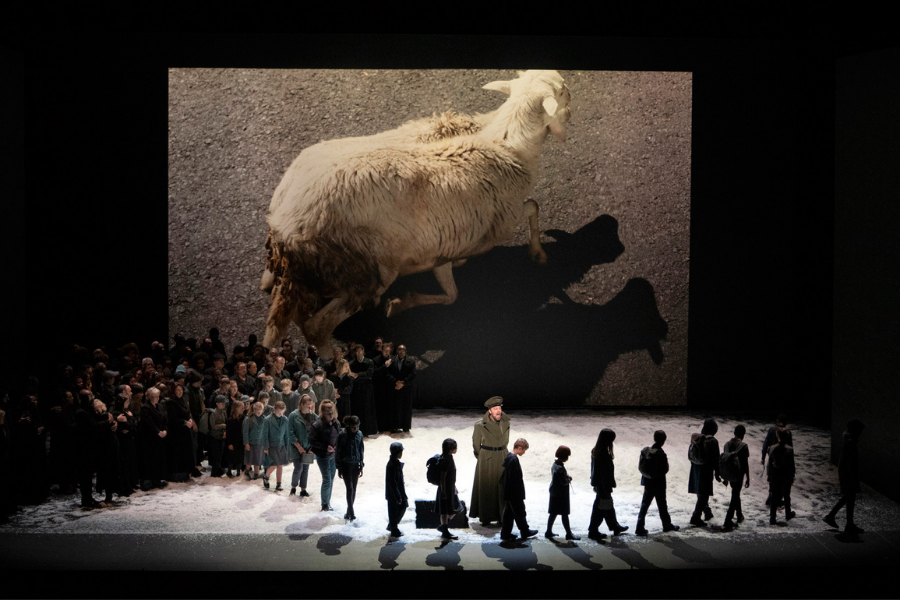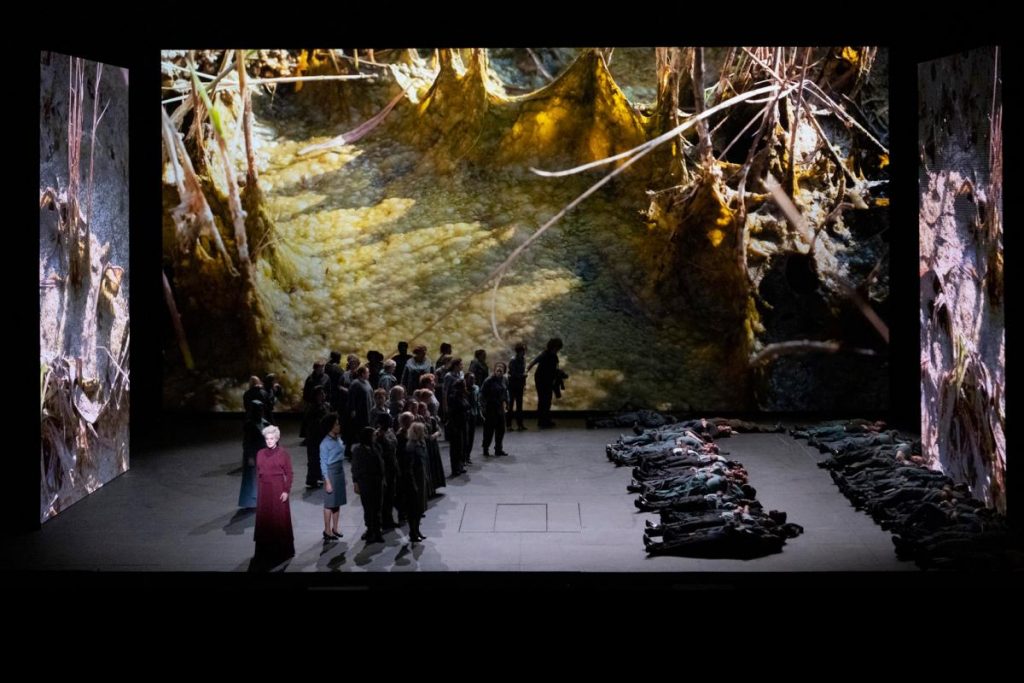“War Requiem” de Benjamin Britten llega al Liceu con una producción escenificada firmada por Daniel Kramer y la mirada del artista visual Wolfgang Tillmans

War Requiem, con música de Benjamin Britten y texto de Wilfred Owen, es una página maestra de la literatura musical universal. Escrita en plena Guerra Fría con la amenaza nuclear en su punto álgido (1962), la obra tiene un mensaje pacifista y de esperanza. La producción que se presenta en el Liceu lleva el sello del reconocido director de escena Daniel Kramer y refuerza el mensaje moral del réquiem, añadiendo un trasfondo ecologista. El trabajo audiovisual de Wolfgang Tillmans une el lenguaje del videoarte y la dramaturgia operística con un efecto poético en la escenografía.
La música y las artes se fusionan en el escenario del Gran Teatre del Liceu con War Requiem, obra de Benjamin Britten que llega del 19 de octubre al 2 de noviembre al Teatre con una propuesta escénica firmada por el director de escena de Daniel Kramer y la mirada del fotógrafo y artista visual Wolfgang Tillmans. Después de estrenarse en 2018 en la English National Opera, la producción se podrá ver por primera vez en España.
En 1961 Benjamin Britten recibió el encargo de escribir una pieza con motivo de la nueva consagración de la catedral de Coventry, que había sido destruida por los bombarderos alemanes durante los ataques aéreos de Hitler contra Inglaterra en la Segunda Guerra Mundial. Aunque en la fecha del estreno del War Requiem -el año siguiente, el 30 de mayo de 1962- la catedral todavía estaba derribada, la idea era construirla de nuevo, y la pieza de Britten debía simbolizar la victoria los valores de la paz y la reconciliación sobre los de la guerra y la destrucción. La gran aportación de Britten, más allá de la enorme y compleja escala musical de la partitura -escrita para orquesta sinfónica, orquesta de cámara, coro mixto, coro infantil y tres voces solistas-, fue, por encima de cualquier otra, la inclusión en el texto de un ciclo de nueve poemas -que son más lieder en la tradición de Schubert, Wolf o Strauss antes que arias- escritos por Wilfred Owen. La intercalación de los poemas de Owen, que cantan las dos voces masculinas -el tenor representa un soldado inglés; el barítono, uno de alemán-, es el que da al War Requiem esta dimensión secular y, también, la que permite propuestas como la puesta en escena planteada por Daniel Kramer y Wolfgang Tillmans, que acaba dando un profundo mensaje ecologista. Sobre un fondo negro, la producción se articula sobre todo a través de las pantallas de Tillmans, que reflexiona sobre las guerras, la humanidad y la importancia de un retorno del hombre a la naturaleza.
En su forma final sobre el escenario, esta producción del War Requiem es tan compleja y colectiva como la parte exclusivamente musical: además de los aspectos relacionados con el vídeo y la iluminación, también es importante la labor coreográfica de Ann Yee, figura encargada de dar movimiento y sentido a la presencia simultánea y caótica de tres coros -masculino, femenino y de voces blancas-, que son los bloques humanos que, en realidad, arrastran el verdadero peso de la obra. Las funciones contarán con la participación del Coro del Gran Teatre del Liceu -dirigido por Pablo Assante– y con el corazón infantil VEUS de Granollers, que se complementarán con la Orquesta Sinfónica del Teatre al completo, dirigida por el maestro Josep Pons.
Los momentos más líricos y delicados del War Requiem recaen en tres voces solistas, y por ello es importante que, además de una orquesta bien articulada y unos coros experimentados, las funciones cuenten con una soprano, un tenor y un barítono de alto nivel. La soprano será Tatiana Pavlovskaya, una de las grandes spintos de las últimas décadas, una cantante veterana -formada en el Teatro Mariïnksi de San Petersburgo como miembro de la maravillosa cantera descubierta por el maestro Gergiev- que alterna papeles de fuerza del repertorio ruso o wagneriano con las grandes heroínas mozartianas, un equilibrio entre lirismo y contundencia que hacen una intérprete ideal para esta parte del réquiem.
El tenor será el veterano Mark Padmore, una de las grandes voces inglesas -especializado en lied, en partes solistas de oratorios y, más en particular, la obra de Benjamin Britten-, mientras que el papel del barítono, lo defenderá Matthias Goerne, un cantante con un perfil muy parecido, con mucha experiencia en el lied alemán -fue alumno de Dietrich Fischer-Dieskau, que cantó en el estreno del War Requiem– y en papeles de gran intensidad del repertorio wagneriano y del siglo XX. Un elenco, en definitiva, perfecto para defender todas y cada una de las delicadas partes de un conjunto tan frágil como majestuoso.






